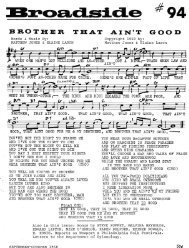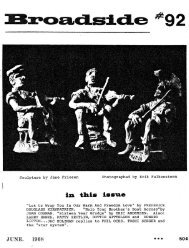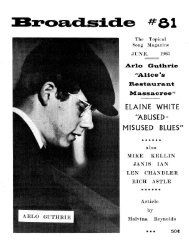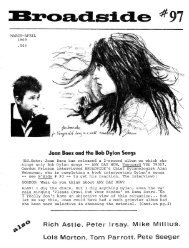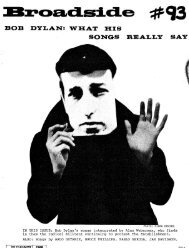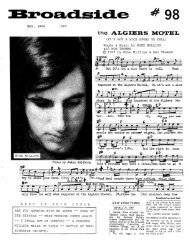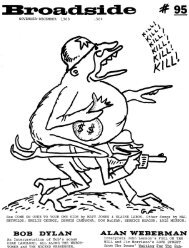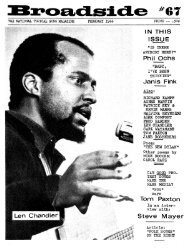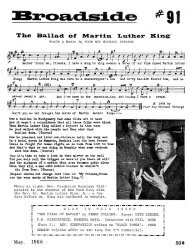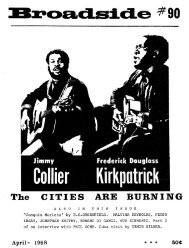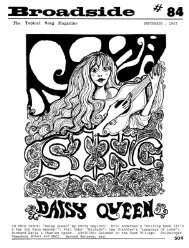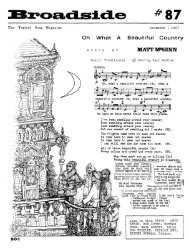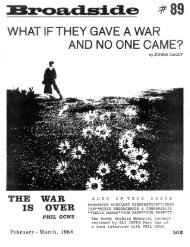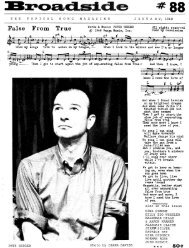b096
You also want an ePaper? Increase the reach of your titles
YUMPU automatically turns print PDFs into web optimized ePapers that Google loves.
JANUARY-FEBRUARY 1969 .50¢<br />
FREDERICK DOUGLASS KIRKPATRICK<br />
Photo By ERIK FALKENSTEEN<br />
IN THIS ISSUE: "Farewell Mr. Charlie" and "The Chinaberry Tree" by<br />
F.D.Kirkpatrick. ALSO: Songs by TOM PARROTT, INEZ BAKER, ED LIPTON,<br />
LINDA JEAN FRAME, WALLY HILLE & AARON KRAMER, MICHAEL STRANGE, ROSALYN<br />
WILL, STEVE SUFFET & ADAl'-1 KREISWIRTH. Articles: "Today's Folk Rock-'N<br />
Blues & Pop Ivlusic" by Waldemar Hille; "Rev. Kirkpatrick Vs. The White<br />
Power Structure" by G. Friesen.<br />
e •••• _ •••••••• eft •• ee ••• eeeeee.e ••••• e •••••• ~
~2-<br />
THE WELFARE SONG<br />
Rpc..k it:<br />
Words & Music By MICHAEL STRANGE<br />
© 1968 by Michael Strange<br />
gave me this re-ply, Not e- nough to live on but a little too much to die. (Spoken Wl.th a)<br />
- downward slur<br />
So I went back to my old lady<br />
Man, I told her where I'd been<br />
Out there giving stupid answers<br />
To all their stupid questions<br />
It seems they have a little<br />
scheme<br />
By which you might survive<br />
Just stay within your budget<br />
Good luck, and stay alive<br />
But you'll need more than<br />
luck, baby<br />
'Cause even if you try<br />
Not enough to live on<br />
But a little too much to die.<br />
Now the worker came to my house<br />
He was counting all my clothes<br />
He asked how many kids I have<br />
Then he counted them by the nose<br />
He said I'd get my check next<br />
week<br />
I'd get it without fail<br />
But that, of course, depends<br />
That it don't get lost in the<br />
mail<br />
I said, Does that happen often?<br />
But he just blinked his eye<br />
Said, Not enough to live on<br />
But a little too much to die.<br />
So the folks are allan line now<br />
-They're filing out the door<br />
The man gave me number 903<br />
And then called forty-four<br />
Haybe he wants me to play that<br />
number<br />
'Cause I just can't get by<br />
With not enough to live on<br />
But' a little too much to die.<br />
!(Last verse music same, but<br />
no repeat needed)<br />
II<br />
][J'~ N.Of r~~ l1A1[<br />
Words & Music: ROSALYN WILL<br />
© 1968 by Rosalyn Will<br />
Am F 7 c 7 , "1J1 6 7<br />
1. One day soCiii'- the sons of men shall reach the moon; Do we suppose that love is found up-on a<br />
2. Here be-low- a man hates men he does not know; Does he im-a- gine thin will change up there so<br />
r, C ',Z.e.. (.1 1)1 G:r 1) A Bm ~gS ~ :t><br />
. ,; I;:' .. :L cry,) 15 II p,f·' .... ~#fi!%F-1 p" J I Lilt) J I<br />
:f- l -=q (iJ • - ~ « i, ~ I I F UI -I T L__ - 111"- D. iii<br />
star? -- far? _ We dare to fly in-to un-charted skies But will not 11s- ten<br />
Ef :D A:D C G- e;. m Co A1Tl D7 e:,. J)7 t\<br />
titS J J I 0 I J I l' JJJ J t! J J I J" JJ W, ~! I JI ~ F' 0 I<br />
to a brother's cries. Worlds a-part - We try to change all but tihe heart, - And if de-bate should<br />
& C Am F .Dm &7 C<br />
I J, )4<br />
~ [J I D I cJ A J i ~~ ;' cJ I J ~ err 4 I ~ I ;'<br />
................ d<br />
-." ~ '--""<br />
fail, our guns are near at hand. - It's not too late,- The moon & stars have got to wait, - The<br />
r~ D [' 61( p &J ~ J J I ~> ... 3:' II ~<br />
space be-t\ofeen us is what we must un:-der- stand. - ~..,.:"", tt."<br />
-----------------------------.15RO(~l>3/IJE. :''{b
-3-<br />
Fare'Well Mr. Charlie<br />
, ,<br />
~mJU<br />
Words: Rev. Frede~ick D. Kirkpatrick<br />
Tune: Ada.pted fromTrac,l.i.~ional<br />
@1968 byF. D. Kirkpatrick<br />
2o~1~* i@J-J 31 EJ nl J 2 !1J-JJ11i:J J JI<br />
1. Bye bye, M~ster Charl~e t. e ,trumpet has sounded, _It ",as heard in the cities, they are falling to the<br />
?(JJM JJJ1.J-=£1ki J J1JlJJ .dLp-lIJzZJJJ44]J<br />
groun • - Green trees are bending"" rocks are crying out, Bye bye I4ister Charlie ,y()ur system is a<br />
**, ___ ___ I 41~ ___ J J P,. Ij 113~1-1 U<br />
pri-son and we must. leave now~<br />
2. If we don't get good appliances<br />
we will throw them away -<br />
No more Motorola<br />
just R.C.A.ls.<br />
I wouldn't' call this looting,<br />
just getting what IS mine;<br />
There is no use of "reeping,<br />
There is no use of crying,<br />
Everythingls going to be fine.<br />
II ·<br />
3. We made cotton king<br />
And didn't get a thing<br />
But poverty, brutality<br />
And a sleep in the rain.<br />
Now the tide is turning<br />
And everything is flame;<br />
Farewell, Mister Charlie,<br />
The cities are falling<br />
And it causes roe to sing<br />
4. The imperialists and,capita1ists<br />
Are in the court yard -<br />
Twenty thousand Black boys<br />
Have escaped from:the guard,<br />
From a place of imprisonment<br />
For three hundred years;<br />
Farewell, Mj.ster Charlie,<br />
The sky is on fire-<br />
And we have no fears.<br />
--_. -.--. _. - -_. - --- - ---_. _. --_. _. - -_. ---'---_.-<br />
Words & Musicby,Rev. Frederick D. Kirkpatrick<br />
The Chinaberry Tree<br />
'. '@ . 1968 by F. D. Kirkpatrick<br />
(An explanatory note for this song: "Mr. Bub-:ileges for either -ar~' non-existant. Teachers<br />
bub-em" is an old ter.m Southern blacks use to wh,otry for change are arbitrarily fired by<br />
describe a black overseer keeping black workers Mr. 'Bub-Bub.,.Em and oth~rs brought into replace<br />
in line for the white plantation owner. It them, with the hope they will be satisfied to<br />
carries the connotation of mingled contempt, settle down under the Jim Crow setting of the<br />
and ridicule. Many of the ,black colleges in institution~Symbolic of this settling down is<br />
the South are nothing more than intellectual<br />
plantations with the black presidents serving<br />
"a seat tip under the China Berry tree~" The<br />
fruit of these trees is a 'golden-colored perry<br />
as "bub-bub-ems" for Mr. Charlie. To carry out and one can, I suppose, sit under the branches<br />
the mandates of the white power structure stu- and dream with the illusion that. the berries<br />
dents and fa;culty'are equally oppressedipriv- one day may turn .tonuggets ,of re~l gOld.<br />
¥! ttftaf1gJ;;lJ*,'rJI.JtY~l3u¢ w.<br />
jl!J,~t;;'K')<br />
: Hel-b Mister. ",,:~.uQnr. 'why d).dY,:ongf;t :nd of me~- '. I ,wereonlytryin I to tq.\tita,·· seeii; ber<br />
.... '
Our Children Are Dying<br />
-4-<br />
Three crushed & bleeding families, with no bath,<br />
in tw small rooms<br />
Where in the winter there's no heat, eight children now<br />
, another:~ soon' '<br />
Five faces scrubbed" they run away to find their lessons<br />
in the: ,school,<br />
To 1earp. a l~fe,they ,.cannot 1e?-d. and learn by rote the,<br />
goldEln~1.e;' , ' , ~', Chores,<br />
Hith eager, awk!·;ard nqnds at first, they try to wi"<br />
the teacher's heart<br />
And though the teacher ~ries so hard, forty loves<br />
have 'no chance to start,<br />
And' soon the children know the rules, there's no time<br />
for love, only time for fear<br />
The funeral starts here..... Chorus (Repeat "Our<br />
.children are dying" six times a~)<br />
Bayou Baby<br />
lfords & Music by INEZ BAKER<br />
© 1968 by Inez Baker<br />
, E'Bayou ba-by, by"-o-by. '1 §andrrian' s watching in the s1:y; If you<br />
'-'(0'; p r p 1~~'J'.t]:J. 1:p 1 ;t, l'" r J i11<br />
, don't 'wake tomorrow You'll mow why I sa1d: Love won't- take the place f<br />
if G:s ,', c'-l ~ t= ' '~ '~, " ,(7 0<br />
J J (;. p ~ J ~Fj I 2· 'hi j J, , ~<br />
, sUpper:, Dad-ely, try and "get s~mebread. CHO; I~l1 se you of a'<br />
If fJ"r" J j ,01>!j. y' pl,;l ) , ~<br />
D<br />
t' J<br />
Mothe!,",~ H:r firstboI'!:l, on her mee -- He l,~ft to feed the poor folks<br />
*',}'\ Tn AD ?a II, ",'<br />
',And died to ~e us free.<br />
Bayou baby, byo-by<br />
Look-a-yonder, tion "t you cry I<br />
See the poor folks a-passing right now<br />
by the door?<br />
'<br />
I'd go with them but I'm busy<br />
Mule, you'll pull a plow no more. CHO.<br />
!lIj.You baby, byo-by<br />
H~aven's price is,mightYhigh;i,.<br />
If it wasn't for Jesus you krlmt what<br />
I'd do<br />
Sell my soul and buy rrry darling<br />
Life, sweet, life,.' and)c~dy:;tool CHO.<br />
Bayou baby, byb-by<br />
Born to taste this world and die<br />
I see help j sa-coming, I sure know<br />
the, sign, '<br />
Master, take my pretty burden<br />
But let me rock her one mora time.<br />
, , CHO.
Tom Joad, Revisited<br />
~ .... -r- -r -r<br />
John Steinbeck wrdte "The Grapes of \vrathll ,And \ioody put<br />
JEI'f.l J 1£1\ fj j<br />
\'>/ords by EDHARD LIPTON<br />
Music adapt1d from Traditional<br />
j<br />
-+<br />
JfFi<br />
Ford andZanlick made a movie out of it ,But all of it I s<br />
-5-<br />
-.;<br />
it into a song,John<br />
Am<br />
.-I-y<br />
still gOlllg on,<br />
f ~ .. (11. c,.,<br />
LEMETRO<br />
ViJ.J.!-tt $.11<br />
All of it's. still going on •<br />
City College of New York<br />
Nov. 18. 1968<br />
The story of the Joaqs, why it took place<br />
Some thirty odd years ago,<br />
'r'he movie it was made around 1940,<br />
My ,Mywe s uremove slow. Lord. Lord,<br />
My, My we s.ure mOve slow.<br />
A Ga.li forniagrap,e s trlkegoin I on<br />
Migrants fight in. , for decent pay.<br />
Too t' s not from the book, not thirty years<br />
I'm a talkin' about today. Lord, Lord,<br />
I'm talkin' about today_<br />
If a migrant worked 52 weeks a year<br />
And none of 'ern ever did<br />
He'd make twenty-four hundred dollars a year,<br />
Tha t 's not enough for a wife and kid,<br />
Not enough for a wife and kid.<br />
ago,<br />
I saw some people a-picketing a store<br />
Begging others not to go in,<br />
Sayinl this store is sellin' California grapes<br />
And if you buy 'em the. scabs is gonna win, Lord, Lord,<br />
If you buy' em the scabs is gonua win.<br />
So many people paid no attention at all<br />
They ignored their brother's call.<br />
Them California grapes, they look so mie;hty good,<br />
And you can't taste the sufferin' at all, Lord, Lord,<br />
You can't taste the sufferin' at all.<br />
People weren't being asked to give up their lives<br />
Or even one cent in pay,<br />
Alltha t they was being asked to do<br />
Was to shop at a store one block away,<br />
. Just .one block away.<br />
How many of the people who ignored that picket<br />
And don't care where the grapes was growed,<br />
Have stayed up towatch the movie on 'IV,<br />
And wept at the plight of the Joads, poor Ma.<br />
Wept at the plight of the Joads.<br />
How many who watched that strike a-beln' broke,<br />
And Preacher Casey bein' hit on the head,<br />
Walked through that picket line and into tha t store<br />
Cause it was a movie and be ain't really dead,<br />
A movie and he ain't really dead.<br />
Well the landlordS they still ovm that land<br />
The poor travel a hot dusty road<br />
But here in New York City, why it's none of<br />
our concern,<br />
The hell with il'la and Tom Joad, Lord, Lord,<br />
The hell with Ma and Tom Joad.<br />
© 1968 Edward Lipton<br />
All Rights Reserved<br />
Cesar Chavez addressing a group of United Fann Workers ..<br />
Photo: Ralph Showalter·<br />
i<br />
J 2£1<br />
Lord, Lord,<br />
When asked to put an article<br />
in his school newspaper .on the<br />
grape boycott, the senior student<br />
editor asked: "How is this rela<br />
ted to the studen tson<br />
campus?"<br />
Three weeks ago, eleven students<br />
at Berkeley were busted for<br />
trespassing and disorderly conduct.<br />
They were demonstrating<br />
against the University'S purchasing<br />
of table grapes and its failur:e<br />
to admit a proportionate number<br />
of Mexican-Americans to the<br />
student body. For these students,<br />
perpetuating poverty is not<br />
their bag. Unlike most people of<br />
the world, they know that<br />
hwnan beings are forced to live<br />
in unhygienic work camps,<br />
forced to have their children<br />
work in the fields, forced to<br />
forfeit their children's education,<br />
and forced to fight for every<br />
meal.. _•..<br />
In California, agriculture is the<br />
largest industry. Gross income.<br />
from '~agribusiness" in 1967 was<br />
$4 billion - and the average<br />
fann worker's share w excluded from a number of<br />
routml'l benefits, such as un<br />
~mployment insurance, worknen's<br />
compensation, . social<br />
security, welfare assistance, and<br />
child labor protection. For many<br />
years, they were excluded from<br />
federal minimum wage standards<br />
as well. The original National<br />
Labor Relations Act<br />
intruduced by Senator Robert F.<br />
Wagner, included the farm<br />
workers. But the final law left<br />
them out in the cold, and their<br />
status remained unchanged until<br />
this year.<br />
To Obtain the benefits he<br />
needs to live a decent life, the<br />
fann worker has struck, is<br />
striking, and will continue to<br />
strike. But the effectiveness of<br />
his strikes in the past have been<br />
severely curtailed by Public Law<br />
78 - the so-Called "Bracero<br />
Law." This was a contract between<br />
the . United States, the<br />
Mexican government, and the<br />
growers, for the importation of<br />
Mexican nationals. As many as<br />
350,000 foreign workers (mostly<br />
;Mexican nationals) were allowed<br />
into California to harvest the<br />
crops. Needless to say, the<br />
braceres always worked for less<br />
than the Americans. Union<br />
organizingW'as almost impossible<br />
because of the ever-present<br />
threat of strike-breaking. Finally,<br />
Qecause of strong union, church,<br />
arid civic. lobbies, Congress terminated<br />
Public Law 78 in<br />
December, 1964. Soon after,<br />
Secretary of Labor Willard Wirtz<br />
issued regulations inaking it clear<br />
that PublicI,aw 414 (Immigration<br />
Act) was not to be<br />
used as a substitute for the<br />
bracero program. In other words,<br />
foreign workers were not to be<br />
used as strike-breakers. But the<br />
Department of Justice, the<br />
Department of Immigration, and<br />
the Border Patrol have all been<br />
remiss in enforcing these Ia:ws<br />
and regulations. Therefore, there<br />
is a plentiful supply of cheap<br />
labor greencarders who are still<br />
being used as strike-breakers in<br />
the current struggle in California.<br />
So the fann worker has faced<br />
almost insurmountable obstacles,<br />
road blocks and pitfalls on the<br />
road to forming a strong, effective<br />
union. But, thanks to his<br />
persistence, his efforts are begin-<br />
. ning to payoff and his union has<br />
become the "new frontier" of<br />
the labor movement.
-6-<br />
INNEP5 AND OUTERS<br />
deed<br />
I.To show jDLlf SOli\ ihe8 0,11 0gree is C\ VY\\'3ht::) Pi,'\tc wa::l {:or C\<br />
2. I fiot.o. 'bu.estioV\ jl\st, POI' gCL\ i~ ~otAr I {IS Ides ShOLDeq whC\t<br />
,3, J.t' the. In-s',dEs c.OLlnL so {\'\v,c.h wh.':) Qre pe.o pie.<br />
4. It' ever ::lone. tDQS stripped cw\d \xwe so we c.otAlc\, see<br />
C . . . '.. . F (77<br />
L . r J~r F··· rJFF~I-=L-=LlEF<br />
rnaJ) to .be E\le.\'~ maYT shov.\,c\'nQ\le (,\ heart ~o(' th;s +neLj SQ~ 'is the<br />
wOIA\d~oLido ~OV,\d ~1e. mon jOIA'ct I;ke, to be stru;d ('\'2\ht mere +O{'<br />
out 6P touc.n \-eQr 1'5 wh,\ we. stand apqrt 110L\ ccan t set hurt iP ~o\A've<br />
uJhQt was there I (0onde('Sv we'd. be C\-~rClid<br />
too hloh C\ price<br />
c F ~ ,<br />
~ ~EffPo-Fr--FFr=rrtL~t;q-1<br />
ver ,:) best part<br />
all to see<br />
got, no heart<br />
m'l\3ht be. PQld<br />
Gr<br />
r C<br />
Make.s no differeIlce ;\-' jour s\rie\\ \s<br />
OI'lDculdaou. WCI(\t to tr;j Q0c1 h,de the<br />
Lot's oP thlN)s '':0 th,'!\~\ C\b()L~t<br />
To \e.Q('(\ what n~en m\.-DO ,Q'"E;. ,LO 'Su.JU'l50.-l"oL\(\cl<br />
F('ob\e)'YIswe COYl qi,\u.Jor\\ OU\.-. ,Ioke. VV1.,-\ hOrnd looh and \See<br />
be on Oi.0- I='u\ s\r\oe-\:\ to see Fort\rve. sheet1 thox c.CJverS {Y\C\(\'S inslc\es<br />
c<br />
+! -'- ' 't t' I<br />
v:Ci~ IS WhO he. p80 p E:.-<br />
tne'ln·sic\e out oi'id the outside..<br />
Y¥I,,\ out-s.de's down Qfld th lSI S<br />
be..'hea"tYI it too The evi \<br />
I<br />
I<br />
S81~ -<br />
c\OUJV\ -<br />
(1/\ e.<br />
h;des -<br />
IF<br />
© £lopyright 1966-1968<br />
by Li ttl" Wind MuaicCo.<br />
WHO IS MY BROTHER?<br />
Linda Jean Frame is a West Coast<br />
songwriter, performer, painter, ,<br />
poet and artist (among her drawings<br />
we've used was the one on<br />
the cover of S'Side '82.) Ber<br />
first book of poetry, WINDINGS,<br />
is being published by Windfall<br />
Press , 1814-E Norwood Street.<br />
ChIcago, IlL 60626, at the<br />
special Pre-Pub price of $3.50.<br />
Now 25 years old, a crippling<br />
disease calledS~stemic Lupus<br />
Erythematosus, dJ.d·not keep her<br />
from travelIng, allover the u.s.<br />
Hawaii, and Canada (with her<br />
family), South America, including<br />
4 months in Chile (alone),<br />
and last summer, 12 countries<br />
in Europe (with a companion).<br />
With a knapsack, autoharp, art<br />
materials, listening, singing,<br />
writing, and drawing_<br />
T H IS W 0 R L D HAS BEEN A P RI SON -Words by<br />
AARON KRAMER<br />
Mu~ic: adapted toan Irish MelodybyW. Hille<br />
50011·05<br />
were ri5~, en, mean to see it<br />
in shad-ow, It's time I shared the<br />
a - wak-ened I taught that dream to<br />
shine. One<br />
dawn. Too<br />
him. This<br />
.BROAD.5IJJE ~'16
,~ ',~:'<br />
'" -t,· /'-';~~':J'<br />
~!j~~,;~"E<br />
-7-<br />
AN~M,ALS DO?:"<br />
,~;€rI968:"by Edward Lipton, all rights reserved •<br />
. five ol,-eloekin the -
-8-<br />
NOT E S o N T 0 DAY'S<br />
FOLK ROCK .. 'N-BLUES<br />
and<br />
POP MUSIC<br />
SUGGESTING A NEED FOR PERSPECTIVE<br />
By WALDEMAR HILLE<br />
"Rock music is the only constructive element<br />
in society", "Rock wants nothing of the corrupt<br />
politics of today", "It understands the Revolution<br />
instinctively", "It is an electronic theocracy,!!,<br />
" ... a universal techno-structure", "an<br />
oral exorcism", It is "Dylan's existentialist<br />
riddle-world", "It will really come into its own<br />
when Pop Music embraces Revolution".<br />
I don't know if I understand the full implications<br />
of the above selected quotes, but they are<br />
awesome, and certainly contain food for thought<br />
and some truth (or some half-truth?). If for you<br />
as ,forme they seem to lack perspective, then<br />
nevertheless you and I can accept or sympathize<br />
with a ,more modest quote: "Don't knock the Rock,<br />
its nearly all we got".<br />
PERSPECTIVE--INVECTIVE--DIRECTIVE--COLLECTIVE!<br />
But also, before you knock "Perspective", let's<br />
examine what it is. First of all, on a broad<br />
human scale, it is the acceptance (I hope) that<br />
we are all "social animals" by nature and not by<br />
nature isolated alien entities. Then perspective,<br />
it seems to me, must include the conviction that<br />
though changes in society modify human nature,<br />
they do not abolish it. During a period like<br />
today with its "revaluation of all values" there<br />
is need for the affirmation of certain standards<br />
of realism in life, the arts -- including music.<br />
Such standards would be the "sine quo non" which<br />
must be consciously or unconsciously accepted;<br />
deciding 'whether the intent of the music or song<br />
or art work is a flight from reality -- in a basic<br />
sense -- or a willingness to face up to it.<br />
Whether the intention is primarily one of<br />
selfish-success and opportunism; or whether there<br />
is implicit the acceptance as a member of a human<br />
community -- in which music and musicians playa<br />
role. In which they playa role, however small,<br />
toward a better life. The realization, therefore,<br />
that in any work of art, perspective is of<br />
overriding importance. An artist shows<br />
perspective by distinguishing the crucial f:o~<br />
the episodic, the 'important from the superflclal,<br />
etc. -- as it relates to art -- as it relates to<br />
life. An artist-musician~ creative work shows<br />
perspective in being not based on understanding<br />
only day-'to-day events, but on the conscious andl<br />
or un-conscious possession of a perspective indepe'ndent<br />
of, and reaching beyond, his understanding<br />
of the contemporary sGene. Before going on,<br />
I would like to quote from my fr'iend Norman Cazden<br />
a comment which relates to my subject. He refers<br />
to a'book in which "the Ame:fican Revolution is<br />
attributed to the, popularity of'thequick-step<br />
(as in Yankee Doodl~), the rise bf Nazi~ism to<br />
the goose-step, etc:" And he adds:-If that all<br />
sounds childish,' just consider some of the Telegraph<br />
Avenue guru-leiters who talk of overturning<br />
society with this or that rock-n-blues ... "<br />
SOME SWEEPING GENERALIZATIONS ....<br />
As a rule, I would prefer to take actual musical<br />
examples of recordihgs or performer" for<br />
review -- and make comments on these. But, I<br />
believe, there is also a need to try to get a<br />
broader view of the present-day music scene, and<br />
to try to make general critical (positive and<br />
negative) observations. with all the "57<br />
Varieties" of folk rock-n-blues, "soul" and<br />
pop music -- not to mention the on-going stream<br />
of Jazz -- it is hazardous to make sweeping<br />
generalizations. Still, it seems worth the<br />
candle to get some perspective -- with the hope<br />
that this will help various popUlar-music streams<br />
to relate with more understanding to each other<br />
and life's social needs (patterns). Perspective<br />
can also be profitably brought to bear upon<br />
relations with the so-called classical "longhaired"<br />
music, and finally also to relate to the<br />
prospects and understanding (where possible) of<br />
potential future directions. For example,<br />
some people are saying that "Rock is getting<br />
Arty" or "too complicated." In Pop-and-Jazz<br />
magazine of Oct., 1968, I read that Jack Casidy,<br />
bassist of the Jefferson 'Airplane says: "I hope<br />
that what happened to Jazz doesn't happen to<br />
what I call Rock and Roll. I mean Jazz became<br />
verv intellectual. There has to be a certain<br />
basic communication. You have to keep in touch"<br />
Or, says contributing editor Ralph Gleason of<br />
Pop-and-Jazz (ibid), "A Jazz fan today won't<br />
listen to a rock band because of the label. A<br />
rock fan won't listen to a jazz band because of<br />
the label. To some, the only music that can be<br />
taken seriously is composed, conservatory oriented<br />
music. II<br />
THE "BIG SOUND"<br />
After that flight into the thoughts of specialists,<br />
let's get down to specifics, ,?r some "nittygritty"<br />
perspective on ROGk. Practlcally everybody<br />
talks about the BIG SOUND of electronically<br />
amplified performances. Does this physically<br />
knock you out and shat'ter your innards? It's<br />
supposed to, say the purveyors, producers an?<br />
afacionados. This is in order to shock you lnto<br />
listening. This physical WHAM! gives a feeling<br />
of closeness to the group. Together, you become<br />
part of it, or if you can't take it (the<br />
physical WHAMmy) you're out. You have a touch<br />
sensation of the sound, you feel the nOlse. It<br />
is the pop-music sound of the present generation.<br />
It has also been said "The kids don't dig the<br />
war in Vietnam -~ it isn't loud enough." This<br />
may be meant partly as a joke -- but it says a<br />
lot. It's certainly more humane to dig a BIG<br />
SOUND than a DIRTY WAR. So, if we try to get<br />
perspective on Rock and Roll Blues it doesn't<br />
mean putting it down, it means treating it as an<br />
important cultural phenomenon, which deserves<br />
attention.
COMPARISONS WITH THE CLASSICS<br />
In comparison with rock and pop music of today,<br />
masterpieces of thepast--composed by the Beet·<br />
hovens, Bach, Bartok, Mozart, Debussys, etc. are<br />
on a different plane. Comparisons are of dubious<br />
value because they - the classic masterpieces and<br />
today's popular music - are really not synonymous.<br />
Yes, Pop groups are adopting and adapting themselves<br />
to string quartet sound, Indian-sitar color,<br />
Stravinsky's effects, and all the other modern<br />
"serious" composers. But .this is only a sort of<br />
free-grabbing in the air. All they do is throw in<br />
a bit of imitative effect--.which is associated<br />
. (by the surface listener) with these "classic"<br />
sounds and composers, It's like what a previous<br />
generation did to Schupert in "You Cire My Song<br />
of Love" from the Student Prince, or to Chopin<br />
in "I'm Always Chasing Rainbows". Contemporary<br />
classics-- having today's idioms will<br />
only be written when and if young talented composers<br />
involved or cognizant of present day youthpop-rock<br />
style get over being "prash" about it.<br />
That is, these new "classics" won't come from the<br />
pen or "soul" of a brash one-year star-wonder who<br />
says: . "Next I'll write a symphony and tour the<br />
country with it!"<br />
On the other hand the leaders of our popular<br />
music need not get "humble" .in a way that would<br />
make them demean the rock-and-roll or other pop<br />
products; but they should show enough perspective<br />
to be genuinely humble about great music. The music<br />
of .the young writers of pop-rock-,blues-western<br />
when it is good is a marvelous expression of popularfeelings--<br />
but on a different structural plane<br />
and therefore also of expressive potential. Needless<br />
to say, size itself is not the true measure<br />
of any music, but integrated content with form,<br />
when realized in such forms by one capable, talented<br />
and trained to do so-- is what we are talking<br />
about. Here some modern Jazz emsembles or orchestras<br />
are often more nearly corresponding in their<br />
repertoire and performance, and can therefore<br />
more validly be used for critical comparison.<br />
Listening to such Jazz ensembles rehearse or perform<br />
one can feel that there is probably a striking<br />
resemblance to the 18th Century Mannheim<br />
orchestra in Western Germany. This group and<br />
Joseph (Papa) Haydn are usually thought of as the<br />
builders of.the classical symphony-- both as an<br />
orchestral ensemble and with suitable Symphonic<br />
music repertoire. Undoubtedly more prominent in<br />
the Jazz field are the s.maller creative improvising<br />
groups, trios, Dave Brubeck quartets, Miles<br />
Davis Quintets, or the recent artists playing<br />
with John Coltrane, Coleman, Shepp, etc. which<br />
can be compared (at least in some respects} with<br />
early chamber music trios, etc. The classics of<br />
early chambermusic-- and later "long-hair" division<br />
composers and performers is still going on<br />
in our concert halls with the playing of music<br />
by Ravel, Debussy, Bartok, Shostakovi tch, etc.<br />
Siill, the intricacies and musical sophistication<br />
of some contemporary Jazz groups-- especially in<br />
their powers of improvisation-- are a recognized<br />
challenge that even a Leanard Bernstein or a<br />
Lucas Foss (who have tried it) would give a lot<br />
to be able to "cut the mustard" in. In fact, many<br />
a classically trained musician will nowadays be<br />
found listening in awe and admiration at the<br />
achievrnents of such top Jazz ensembles. Here too,<br />
for those involved, it is not a question of overnight<br />
fame and financial success, but of years of<br />
apprenticeship and honest application of the best<br />
these men can give.<br />
ADULT LISTENERS "AGENDA"<br />
Adult listeners are often closed to reason when<br />
confronted with Folk-Rock Blues. They can be said<br />
to have a different agenda than the youth. youth<br />
-9-<br />
says "The past generation was dishonest". We can,<br />
if we relax, admit that the pastgenera.tion was<br />
less honest and we can see that the level of today's<br />
song lyrics are more str?ight-forward.<br />
Adult listeners can perhaps criticize the prevalent<br />
use of drugs (narcotics) and its association<br />
with the hippies and their happenings, love-"ins,<br />
etc.; but adults have to .admit complicity on their<br />
own, and have to feel a collective responsibility<br />
for the fundamentally immoral atmosphere which<br />
exists in our capitalist society today-."and adults<br />
can't blame the youth and their music . for that.<br />
This is of course a subject in itself. Thinking<br />
musically, however, wealso.know that we do not<br />
look down on or cherish the less some Jazz classics<br />
because they were achieved or developed into<br />
their greatness in the unlikely environment of New<br />
Orleans houses of prostitution. Evidently life is<br />
not and has not been a bed of roses. The last generation,and<br />
others past, had its good and honest<br />
musicians, lyricists, performers, etc, of the popular<br />
music of their day. However, today the .world<br />
is in need of being saved from holocaust and today's<br />
youth is living in that qualitatively more<br />
critical knowledge. Perhaps this makes the difference.<br />
Business as usual is out. Middle-andabove<br />
adults are in many cases not geared to<br />
think in this same radical context. This part of<br />
the perspective is where the youth can teach the<br />
rest of us, and is only fully understood by the<br />
young in spirit.<br />
TELL IT LIKE IT IS, BUT NOT JUST "OFF THE CUFF"<br />
So I say, when the poets-lyricists of the youth<br />
movement (be they young or old) connect with a<br />
"drive toward the truth motive" and "telling it<br />
like it is" and a Bob Dylan writes "The Times<br />
They Are a-Changin''', or a Simon, of Simon and<br />
Garfunkel fame, speaks of "Dangling Conversations"<br />
while the "Borders of our lives" are in danger of<br />
destruction. etc., this is perspective. But, on<br />
the other hand, when the afacionados blithly say<br />
"Rock and Roll Blues demands complete attention,<br />
it weeds out the weak", its musiciams are "the<br />
astronauts of acoustical space", then this is, I<br />
believe, a lack of perspective and lack of good<br />
judgement. On the surface and for the moment this<br />
can indeed be for the youth a.great feeling of<br />
power-- like driving a super-model cadillac or a<br />
"space-ship even" for the. best it can do; but it<br />
may be heading for a fall, and shouldn't be misconstrued<br />
for what it isn't. So, in such a case<br />
I would admonish: Ok, ok for advertising, for a<br />
momentary thrill, for fun & garnes, for a happening<br />
etc., but a little PERSPECTIVE if you please.<br />
Waldemar "Wally" Hille plans to use the above article<br />
as an addenda to a pamphlet to be entitled<br />
REALISM IN MUSIC: WHAT IS IT? which originally<br />
ran as a series in Grass Roots Forum. Wally for<br />
a number of years has been organist and choir director<br />
of the First Unitarian Church in Los}mgeles<br />
in addition to composing, arranging and<br />
writing songs. He was an early editor of Peoples'<br />
Songs Bulletin, forerunner of Sing Out Magazine,<br />
and of Sing Out itself. He edited the historic<br />
Peoples' Song Book, first published in 1948 and<br />
still in print (OAK). Previous to that he was musical<br />
director at Elmhurst (IlL) College and while<br />
there his choir was selected as the nation's best<br />
by Fred Waring (of Pennsylvanians radio fame).<br />
Wally has been a supporter of Broadside since the<br />
magazine's inception, a fact of which we are proud<br />
There is a concise biography of Wally in B'side 59<br />
written by David Arkin (father of the film star) .<br />
Da.ve says, "To this day Waldemar Hille continues<br />
with music unflaggingly with the same spirit in<br />
which he began ... American music is the richer for<br />
it.
GETTING TO THE "LYRICS"<br />
Everybody admits (fJ:"iendsandccri tics alike)<br />
that there are some weak,lematerial, is avapable<br />
in useabie form~ for. t:,he's;t:rdy of, t lle ~figiris<br />
of ,the blues , of Afncan rhythm~c and melod~c and<br />
verbal idioms, along with the rural ,and urban<br />
accretions in the USA: in New Orleans, Memphis,<br />
Kansas City, ChicagC),Harlem, etc., and in,deyelopments<br />
imported from Cuba, th,e ,~aril:;>beans arid South<br />
America. 'It maybe argued 'that all this is more for<br />
the musicologist or'Jazz scholar and critic. At' any<br />
rate, much Of thi's "teaching" is going on without<br />
any formal pattern. Records, Jazz Festivals, books<br />
magazine articles all do their part. And there is<br />
no doubt that for, all the separation existing 'today<br />
between the purveyorsbf~Jazz and':Rock, there'<br />
is communication arid exchange going on. The sublety<br />
of the 'Count Basie's, Duke Ellirigtons, a,bizzy<br />
Gille,spie ,the' charm of Charlie Parker , .~he ensemble<br />
of :theMi·lesPavis Quintet, the play~ng of c,<br />
Charlie Mingus ; Ornette Coleman, Archie Shepp, John<br />
Coltrane-- to mention, a few , are all highly res.::.·"<br />
pected-- if not fully understood or emulated by':<br />
the Rock-
11-a<br />
THE REV. FREDERICK DOUGLASS KIRKPATRICK<br />
l3yGordon Friesen<br />
The white power structure more than three centuries ago determined that Frederick Douglass<br />
Kirkpatrick would be born in America when its ships began bringing his African<br />
ancestors to these shores as human cargo - slaves for the auction block. White overlords<br />
350 years later also determined exactly~~$ Frederick was to be born, in that<br />
part of Haynesville, Louisiana, known as the nSawmill Quarters. II For such quarters in<br />
Southern towns are that section across the railroad tracks where white supremacists<br />
force black families to live amid the noise and wastes from the sawmills. His birth<br />
date was Aug~ 12, 1933, he was the first born, and his parents started him fighting<br />
for equality by naming him after the giant ex-slave who escaped North and became one<br />
of the black peoples1 greatest fighters against the white power structure's slave system<br />
-- Frederick Douglass, Abolitionist orator and editor, and consultant to President<br />
Lincoln in the Civil War,<br />
Fred began absorbing the rich musical heritage of the Southern black people at an early<br />
age, for his father was - and still is - a minister in the small churches where<br />
gospel singing is an integral part of the services. His father, Rev" J .L., also sang<br />
with three brothers in the Kirkpatrick Family Gospel i)lartet, which became widely<br />
popular. When Fred was about five, his father became a tenant farmer for a white<br />
landlord on a small piece of land some 10 miles from Haynesville. Fred recalls how the<br />
family walked to this new home.; leading their only possession, a cow which a friend<br />
had given them as a calf and which they had raised, at first on a bottle. By working<br />
virtually around the clock, the elder Kirkpatrick slowly added several pigs and crops<br />
of corn and peas.<br />
Then the family learned first hand what it means to be poor and black and at the mercy<br />
of the white power structure. Mrs. Kirkpatrick died in childbirth and the landowner<br />
immediately confiscated their property - alledgedly to pqy the doctor bill - and ordered<br />
them off the farm by nightfall. Fred has never forgotten, nor forgiven. The mants<br />
name was Crump. "He hauled away everything," Fred recalls vividly. liThe cow, which was<br />
about to have a calf, the pigs, the corn i the peas. Then he told my father to hurry<br />
up and get us off the place, and he didn t care that we had no place to gO.1I<br />
Frederick and his brother, Robert L., and two sisters, Lovie Leola and Mary Helen,<br />
were sent to live with grandparents. Life was cruel, and music was one of few neans of<br />
relief. The children would go into the woods and hold singing services and later on<br />
perform in churches. Fred was 12 years old before the children were re-united with<br />
their father back in Haynesville. Here, for the first time in his life, he went to<br />
school, starting in the 1st grade and quickly graduating into High School. Big and fast,<br />
-- he is now 6 feet 4 and weighs 2B6 pounds -- he was good football material. When he<br />
made all-state he was given a scholarship to GraMbling (La.) College, famed as a<br />
training ~round for black football players who go on to the country's professional<br />
leagues. (Fred did play 1 year with the Dallas Texans of the American Football League<br />
after graduating from Grambling; Ernie Ladd, one of the longtime stars of the AFL, is<br />
ItKirk I s" brother-in-law)"<br />
While he was going to High School Kirk became a licensed barber and earned his way by<br />
opening a barber shop_ He continued barbering at Grambling, cutting customers' hair,<br />
both men and women, in his room at .504 a haircut.<br />
He quit pro football because he found himself unable to put up with the injustices existing<br />
there. tiThe white franchise owners make tens of thousands of dollars in profits<br />
by exploiting black players but they keep the blacks down as second-class citizenso<br />
The whites control the Whole thing, and all positions of leadership are held by whites<br />
-- you see no black head coaches, no black centers, no black quarterbacks on the teams.<br />
There are great black quarterbacks but they 'are never given a chance. It was our tenant<br />
farm allover again, white overseers using the blacks to make money and then kicking<br />
them out when they are througr'1 with them ••• II<br />
Kirk became a teacher in the Louisiana public school system, teaching for 7 years in<br />
black, segregated schools, coaching sports in addition to his regular classroom duties.
ll-a<br />
(Kirkpatrick, continued)<br />
His teams were the first from northern Louisiana ever to win state championships in<br />
either football or basketball.. But the inequalities between white and black continued<br />
to rankle. "I got $200 ti year for my coaching in spite of the achievements. \",lhit,e<br />
coaches doing the same work were getting $1,500 to $2,OOO.~ Nor was it only his personal<br />
experiences that convinced him a real struggle must be TIk~de to improve conditions<br />
for the black people. III saw no betterment in their lives the 7 years I taught school"fi<br />
So he was ready to throw himself into the liberation movement in 1964 when 3 Civil<br />
Rights workers from the North came to Jonesboro, La., where he was then teaching, to<br />
set up a CORE Chapter. He joined them and has been an activist ever since. \Vhite racists<br />
began threatening his life and the lives of his faMily almost from the day the<br />
chapter was established. Kirk ignored the threats and led a school boycott for integration<br />
in Jonesboro. vlhite segregationists responded by driving a 50-car cavalcade of<br />
armed Ku Klux Klansmen through the black community. "They were led by the so-called<br />
law-and-order upholding white police,tI Kirk remarks.<br />
This show of force and continued white terror tactics led Kirk to believe that the<br />
blacks must organize to defend themselves. That summer he founded the Deacons For Defense<br />
And Justice in Jonesboro. Chapters were later set up in southern towns rula all<br />
over the nation. "The Deacons were so-named for the purpose of camouflage, II Kirk says<br />
now .. "To protect ourselves from investigators and such. The powers-that-be thought we<br />
were of the church, and it worked."<br />
But in 1965 Kirk almost lost his life when he went to Bougaloosa to organize a Deacons<br />
branch. Armed whites tried to ambush him and his co-workers as they left the town in<br />
the middle of night in a Ford station wagon. They were chased for a hundred miles at<br />
speeds of up to 110 miles an hour, up and down side roads, racing through red lights<br />
~nd around police blockades. II~Je knew if they caught us it would be Goodman, Chaney,<br />
Schwerner all over again .. But it would not happen without a fight, because we did<br />
have some guns." They finally shook off their pursuers by making it across a lUssissippi<br />
River bridge.<br />
Kirk has been in and out of TIk~ny jails since he began leading equal rights campaigns.<br />
He was jailed in Homer, La., in 1966, 4 years after giving that town its first cha~<br />
pionship football team. It was another narrow escape; he was leading a get-out-thevote<br />
march and a white couple, the man with a rifle and the wife with a shotgun, were<br />
up ahead waiting to kill him. They were arrested by the FBI just before the march<br />
reached the yard where they were waitinge<br />
In Houston, Tex., during the 1967 trouble over the highway running through the Texas<br />
Southern University campus, Kirk was arrested by a nervous deputy sheriff Who threw<br />
down on him with a shotgun. Kirk describes the scene: IIHe was scared; the gun was<br />
snaking, and I waited for it to go off." Kirk had gone to Houston to work on a master's<br />
in sociology after being fired from GrpJmbling College for leading students<br />
against what he calls "the Jim Crow adninistration." He spoke and sa.ng, playing his<br />
guitar, to the Texas Southern students "and pretty soon they were walking down the<br />
street with their heads held high, proud for the first time in their lives to be black."<br />
During the students' attempts to close the highway, Kirk was among those jailed. At<br />
first he was held on $25,000 bail, but was freed when this sum was reduced to $1,000<br />
with the stipulation he was not to play his guitar and sing in Houston nor speak to<br />
more than 3 people at a time.<br />
The last time he was jailed was in Washington last summer at Resurrection City during<br />
the Poor Peoples t Carapaign led by the Southern Christian Leadership Conference for<br />
whom Kirk worked as a staff member over the past several years.<br />
Several events have led Kirk to the realization of the power in song and music. One<br />
came when he led a demonstration in Birmingham demanding the release of Dr. Martin<br />
Luther King, Jr., head of SCLC, from jail.. "He got 5 days; but when we gathered a<br />
round the jail and sang loud protest songs they let him out in 3. I know the singing<br />
did it." Later he was in Dr. King's marches for open housing in Chica.go, and heard<br />
Jimmy Collier singing to attentive crowds (Kirk a.nd Jimmy joined up to become the
ll-b<br />
TIDil _tPPY TRAll.f. -"Dear Gordon: I am glad<br />
LETTERS, NOTES, ETC •• ~ • that you are helping to publicize Izzy<br />
(Ed. Note: In ~'side #95, Pe~e Seeg~r.a~ II Young~s Newsletter. I agree with you that<br />
greed with Ern~e Ma~rs tha~ ~t was silly it makes lively and infomative reading.<br />
to use up space trym? to mterpret Bob There are occasionally items, however,<br />
Dylan's songs. Below ~s some counter-comment which cl)ntain reckless and sometimes disfrom<br />
Wally Hille):<br />
torted charges against his colleagues<br />
Dear "Sis" Cunningham: The articles in which when taken with the usual grain of<br />
Broadside and 1eter in SING OUT on Bob Dylan salt," (and Izzy's signature) do not cause<br />
I feel are a good thing. Bob IIk"ly not be what too much damage. I was very disappointed<br />
we - as image makers - wanted him to be. But that Broadside saw fit to reprint (and<br />
he is certainly a creative person of signi- further Dublicize) some of the most negsficant<br />
dimensions; and the interview in Sing tive and· unconstructive comments of the<br />
Out of Oct-Nov 1968 has a lot of surprises last issue (of the Newsletter). By quotfor<br />
those of us '\lobo have not followed his ing him in the way you did, you lent creprogress<br />
••• I don't believe there is any dance to Izzy's charges without taking the<br />
harm in the extensive treatment he has re- trouble to examine the facts yourself. Esceived<br />
recently, or that it is necessArily pecia1ly in bad taste was the gratuitous<br />
a "waste" or unwise.<br />
editorial commentary which fql10wed the<br />
Perhaps it could be these things if it had out-of-context quotes. Hoping you will be<br />
in any way changed the clear-headedness of more sensitive in simUar future situathe<br />
Broadside editors. But since I don't tions. Sincerely."<br />
sense anything like that, I see it, rather, __ H~P£y_T::a~!. ~g~._E~._S~G OUT<br />
as a healthy sign of a lack of sectarian, "Dear Gordon: I presume that is your covingrown,<br />
speaking-to-ourselves phenomenon. er eartoon on Broadside #95, what with the<br />
There is in it a recognition of the variety initials and all. I don't like it. It<br />
of cultural development relating to the not ~ly makes Mr. Capitalist-Imperialist<br />
youth. A variety that needs positive evalu- look bad __ it makes Broadside look unapation<br />
as well as criticism. Perhaps we can petizing. Thatts like singing a satirical<br />
from some aloof hilltop observe the scene song in such an awful voice you're turned<br />
and remark: "This Dylan could have been a off ••• I am writing a broadcast for nw<br />
veritable giant of a progressive militant KPFA program (in Jan. it will be on prime<br />
songwriter, a modern Joe Hill plus;.o~ a time _ 7:15 P.M.) on Who Needs Horror Pic-<br />
Singing-0rganizer of all the most ~l~tant tures; there is so mUch horror all around,<br />
developments today, taking over in our day fram the cops slugging kids on campuses to<br />
the mantle 0::" the baton of the Heavers, A1- the destruction of children in Vietnam,<br />
manscs Hutchinsons." ••• But it appears that with all kinds in between, like the cor<br />
Bob Dyian has chosen his oWn destiny, and if ruption of the natural scene, and the<br />
it doesn't exactly conform to preconceived dangers of overpopulation. \iel1, we alconceptions<br />
or dimansions (which are in "anY ways have each other to grouse at. Love,"<br />
case hard to measure at close range), he is<br />
Malvina Reynolds<br />
still identified with a very broad spectrum _________________ _<br />
of today's youth and their songs. It ill be- ED LIPTON will sing a number of his own<br />
hooves us to either ignore this fact or topical and children's songs at his folk<br />
hastily throw it aside. There must be con7 concert at the Hebrew Arts School ~ Musidered<br />
evaluation of just what goes on ~th sic & Dance 120 W. 16 st., NYC, Sunday,<br />
Bob Dylan, the Simon-Gar!unkels, the Beatles Jin.i9 at 4'PM, adults $1.50, children 75¢.<br />
the Doors etc., and further to see how they ••• Israel Young's Folklore Center Festirelate<br />
to'the Chandlers, Ians, Kirkpatricks, val: GARY "mITE & PAUL SIEBEL, Jan •.. 20;<br />
Ochs, Reynolds, Broadside, and so on.... Rev. KIRKPATRICK, Jan.27; HAMISH n~\CH,<br />
-- Wally Hille Feb.3; TON: P:u..EY, Feb.lO. All $2 each,<br />
- - - - - - - - - - - - - - 8:30 PM. at Washington Square Methodist<br />
CORRECTION: For Lois Morton's song "Stay A Church, 135 W 4th st., NYC. Info: 9$9-<br />
Little Longer. u" in B t side #95, ~he chords 8811.... At McBurney 1!1Q!,NYC: OSCAR<br />
should be: A-l (measure),D-l,E-l,A-1,D-l,<br />
. BRAND, Jan.l,; MliBEL HIIJ.JffiY, Jan. 26th.<br />
B7-l,E7-2,A-l,D-l,E-l,F#m-l,Bm-l,E7-l,~1, 3 PM, Don. $2.50. Social with refreshments<br />
F#m-l,Bm-l,E7-1,A-2.<br />
following both cnncert.,.<br />
-- - - - - ~ - - - - - ~ -
ll-·a<br />
(Kirkpatrick, continued)<br />
troubadors of the Poor People's Campaign.) til learned; or re-learned, that songs can<br />
reach people where speeches cannot. $1<br />
He learned to play the guitar fram his brother, Robert, who is a successful musician<br />
in Texas playing and singing in the B.B. King style. "He is great,1I Kirk says .. "So is<br />
my father .. And rrr:f sisters have wonderful voices. I hope someday to bring the whole<br />
family together to sing. 1l Kirk has four little children -all girls, Camilla, Elfrieda,<br />
Freddie and Brunella -- who also sing and are learning to play the guitar. The two<br />
older girls can play chords in four keys already, Kirk reports.<br />
He is a master in three distinct styles: church songs, country blues, and the topical<br />
protest songs he has been writing the past several years, songs like those on the<br />
Broadside record "Everybody's Got .i\ Right To Live tt which he and Jimmy made last spring.<br />
Robert Shelton, folk music critic of the N.Y. Times said of a Collier-Kirkpatrick concert:<br />
"Songs with the poignancy of pleas, the immediacy of a headline, the emotional<br />
punch of a fevered cry of the oppressed. If Kirk has been compared to the great Paul<br />
Robeson, and the Washington D.C. Post said of Kirk, "Raw musical poetry that recalls<br />
the great Leadbell.y." In fact, a film producer interested in making a moVie of Leadbelly's<br />
life has asked Kirk to consider playing the leading role .. (IIThey should also<br />
make a movie of' Kirk himself,fI says his wife, fuma Pearl. Others have suggested a<br />
film of Paul Robeson with Kirk playing the part).<br />
Kirk appeared at the Newport Folk Festival last summer and since has been elected to<br />
the Newport Board. He has sung with Pete Seeger on several concerts, and has taken an<br />
active part in the struggle for school decentralization in New York City.<br />
M:r.. Crump made him a rebel against the white power structure and he· has fought the<br />
battle ever since. But he still believes that the widening gap between the ordinary<br />
black and white people of America can yet be bridged, using the tool of an intermingling<br />
of cultures, especially those of musical heritages~<br />
************************************<br />
RECORD REVIEIv<br />
AN ALBUM OF POLITICAL PORNOGru~PHY<br />
Lew Irwin and the Credibility Gap<br />
Music by Len Chandler<br />
Blue Thumb Records<br />
This might be a satirical album if the jokes were funny, but laughter never really<br />
comes, and itts not intended to; and it might be a satirical album if not for the fact<br />
that many of the cuts were put together with the intent of plaCing history; very recent<br />
history, in proper perspective" No, this album, satirical as it sometimes is,<br />
really ha.s to be considered a series of essays on il.merican life. From the Kennedy<br />
murder to the hippies fleeing into the Mountains to avoid the ill effects of a careening<br />
comet; from the first cut, where, in Fraud, California, the first person to vote<br />
in the Democrat primary takes one look at the ballot and stabs himself With the stylus,<br />
to the last cut, where, in Chicago, Illinois, Hubert Humphr~ts acceptance speech<br />
is interrupted by comments garnered from the street, we follow the e&upaign for the<br />
presidency from June to September. In the words of the commentator: Ujunerica the beautiful,<br />
1968; a piece of her. I!<br />
There are 4 songs by Len Chandler, currently the first and only singing newscaster in<br />
the country, who apparently supplies the background music as well, on drums, oboe, and<br />
guitar .. lILong Lines of Mourning" comemorates the deaths of Bobby Kennedy (specifically)<br />
and all the others assasinated in this decade. "Central Park Violence" makes one<br />
of the few really humorous statements, recalling the killer on the comfort station<br />
roof from a different point of view .. "Soul On lcell is for Eldridge Cleaver and his<br />
wife Cathleen. And tiThe Conventional Convention": "The conventional convention I 5 ~,<br />
traveling freak show; itts intentions more freakish than the freaks in its tent. II.<br />
I'd like 'to start quoting .from every cut, but that would be counterproductive. The record<br />
is grim. It's occasionally funny, sort of. It's a record that everyone should<br />
get,.'listen to and then send to his congre~sm.an..<br />
Tom Parrott
-12-<br />
- -,<br />
BOBDYLAM<br />
POET TO A GENERATION<br />
by RALPH J. GLEASON<br />
More and more the conviction<br />
grows than Bob Dylan is an important<br />
American poet. This year, masters<br />
theses by the dozens are being<br />
written by young English majors and<br />
poets in the nation's ~niversities _on<br />
this subject and one IS even be~ng<br />
considered seriously for book publIcation<br />
by a prominent university press.<br />
The current issue of Broadszde (215<br />
W.98th St., N.Y. 10025, $5 per year)<br />
is mainly devoted to a long interview<br />
with a young New York student of<br />
the Dylan work. His name is Alan<br />
''\T eberman and his research has some<br />
illuminating things to say.<br />
"The most important thing about<br />
Dylan," "\Veberman believes, "is that<br />
he represents the collective uI;tconscious<br />
of a lot of people and, beIng a<br />
great artist (I consider him Americ~'s<br />
greatest poet) he's able to verbalIze<br />
what is going on in these many, many<br />
minds.<br />
Dropping Out<br />
"You have a lot of young people<br />
dropping out of our. society t~day<br />
without clearly knowmg why. 'I hey<br />
move to the East Side or Haight-Ashbury<br />
or other communes; t~ey do it<br />
and act in certain protestmg ways<br />
with clothes, drugs, a separate language,<br />
a whole different life style.<br />
But most of them are incapable of explaining<br />
coherently why they are .ding<br />
it; they can't articulate what It IS<br />
that's so terribly wrong with our technological<br />
society as to make them<br />
drop out of it: .. But 1?yla~ can; he's<br />
able to verb.alIze all tIllS; he s the verbalization<br />
of this collective unconscious."<br />
Dylan, Weberman also believes, is<br />
a prophet who "points out some<br />
things years before th~y come to. the<br />
surface." In a fascinatIng analYSIS of<br />
Gates of Eden, Weberman explains<br />
the song in terms of the current .unrest<br />
in the universities ("the kIngdoms<br />
of experience") linking.Columbia<br />
and Berkeley, Dow ChemIcal and<br />
General Motors.<br />
Personal Expression<br />
Weberman believes that Dylan, far<br />
from leaving the world of political<br />
protest for personal expressi~:m, is stilI<br />
a revolutionary poet. He Interprets<br />
one of the Dylan albums, John Wesley<br />
Hardin~, ~s bei.ng a personal accourit<br />
of thIS III WhICh Dylan has left<br />
the radical position of orthodox ideologues<br />
in order to reach young people<br />
poetically with his message.<br />
But he refuses to identify with any<br />
organized group. "What Dylan is saying<br />
is that the days of the French<br />
Revolution - where they had guns<br />
and we had guns-are over with. It's a<br />
different scene now. He's turning<br />
away from the old towards the new,<br />
especially towards the youth. But he<br />
still considers himself a radical ..."<br />
One of the most interesting points<br />
Weberman makes is that Dylan is<br />
consistently ironic. In the Newsweek •<br />
interview early this year, Weberman<br />
observes that Dylan told the interviewer<br />
"Yes, some of my songs don't<br />
mean anything, like Restless Farewell,<br />
for example."<br />
And the point about that, as Weberman<br />
explains, is that Restless F~rewell<br />
is really a protest song agamst<br />
mass media (including Newsweek<br />
which grossly maligned Dylan several<br />
years ago by printing a d~storted st~r~<br />
to "prove" he had not wntten B lowzn<br />
in the Wind) . Restless Farewell co~tains<br />
the lines "the dirt of gOSSIp<br />
blows in my face. And the dust of rumor<br />
covers me . .."<br />
Frankie and Judas<br />
Another interesting interpretation<br />
is that of the song Ballad of Frankie<br />
Lee and .Judas PTiest. Weberman considers<br />
that a parable of Dylan's relationship<br />
with his manager Albert<br />
Grossman (with whom he is currently<br />
feuding) and As I Went Out 0!le'<br />
Morning Weberman sees as explaming<br />
the episode when Dylan appeared<br />
before the dinner of the Emergency<br />
Civil Liberties Committee in New<br />
York. Several of the Dylan songs, including<br />
The Mighty Quinn and I<br />
Pity the Poor Immigrant, Weberman<br />
concludes, are directly related to the<br />
Vietnam war.<br />
Dylan has really offered "what<br />
amounts to a complete systematized<br />
ideology, a complete world view,"<br />
Weberman believes.<br />
The concept of Dylan as a prophet<br />
and as the explicator of the fut~re is<br />
not original. Prof. Albert Bendich at<br />
the University of California more<br />
than a year ago was pointing out the<br />
same thing, and Michael Rossman of<br />
the F.S.M. found startling parallels<br />
to the U.S. military operations in<br />
Vietnam in Dylan's lines in Tombstone<br />
Blues. And Allen Ginsberg, at<br />
the Big Sur Folk Festival two years<br />
ago, offered the concept that Sad:Eyed<br />
Lady of the Lowlands could be Interpreted<br />
as a poem about America,<br />
rather than one having a personal<br />
interpretation.<br />
JOAN BAEZ<br />
CHARLES RIVER VALLEY BOYS<br />
REV. GARY DAVIS<br />
JESSE FULLER<br />
MITCH GREENHILL<br />
FLATT .. SCRUGGS<br />
.nd the FOIQr Mount.ln B01.<br />
JOHNNY HAMMOND<br />
SPIDER JOHN KOERNER<br />
THE NEW LOST CITY RAMBLERS<br />
THE PENNYWHISTLERS<br />
JEAN REDPATH<br />
TONY SALETAN<br />
PETE SEEGER (New Engl.nd Ar .. ,<br />
THE STAPLE SINGERS<br />
ERIC VON SCHMIDT<br />
JACKIE WASHINGTON<br />
DOC WATSON<br />
Call or ... rile for brochures and<br />
availabilities if you wish to arrange<br />
lor concerts with these or other<br />
lolksingers.<br />
FOLKLORE<br />
PRODUCTIONS<br />
176 Fedtral Slreell8ostofl 10.<br />
Massac:huulIsITe/:: HUb bar d<br />
2·1827/Manllel Gr"flhill. man·<br />
",,,I Artlour Gabel. Anodale.<br />
Universal Records<br />
Meanwhile, the speculation and interest<br />
in Dylan continues and his records<br />
have become as universal to this<br />
generation as the paperback copies of<br />
Catcher in the Rye were to -its older<br />
brothers and sisters.<br />
On Telegraph Avenue, as well as<br />
Greenwich Village and other gathering<br />
places of the young these days,<br />
lines from Dylan songs are excerpted<br />
and put on cardboard signs and<br />
tacked on the tables where the fund<br />
raising containers and the petitions<br />
and the buttons are on display.<br />
To understand today's youth, it is<br />
more than useful to be familiar with<br />
Dylan's work, it is ess~ntial. And, as<br />
Alan Weberman pomts out, one<br />
should also listen to Dylan chronologically<br />
from the very first record and it<br />
helps to be a revolutionary!<br />
REPRINTED<br />
FROM<br />
Vol. 7, No. 12, December 1968<br />
.J3ROfjDSI.DE #96
-13-<br />
Joan Cosman<br />
B - April 3, 1914 D - December 14, 1968<br />
J o A N<br />
THOSE LIMPID EYES, THE WINDOWS OF HER SOUL,<br />
ARE CLOSED IN DEATH, MANKIND'S FINAL GOAL,<br />
YET, WITH HER GOING SHE LEAVES BEHIND<br />
HER IMPRINT ON EACH HEART AND MIND<br />
OF US WHO FELT HER KINDLY SPELL<br />
AND, CONSEQUENTLY, LOVED HER WELL.<br />
Jack VanderWoude 12/17/68<br />
(Death comes to songwriters, too. In 1965 it was Peter La Farge,<br />
who has been sorely missed -- he checked out much too soon, for he<br />
could have played a strong role at Resurrection City in cementing<br />
unity between his redman and the poor blacks and poor whites. In<br />
1966 it was Dick Farina. In 1967 it was Woody Guthrie, and in December<br />
of 1968 Joan Cosman. Joan first came to BROADSIDE as a volunteer<br />
typist, and only later mentioned that she also wrote songs.<br />
Her main theme was a cry for brotherhood and against injustice, as<br />
you can see from the titles of her work we printed. Dying of cancer,<br />
Joan last summer financed our Poor People's Songbook from "Restitution"<br />
money ____________________________________________ she got for the death of a relative killed by --the G.F.) Nazis.<br />
Words: Steve Suffet & Adam Kreiswirth<br />
MAY THEIR SYSTEM SOON BE BROKEN Music: Adapted from traditional.<br />
Copyright 1968 by Steve Suffet & Adam Kreiswirth<br />
~ t<br />
eho:<br />
J3 IJ<br />
«<br />
d &1 !"=;J J ~~' C ~ (<br />
C May thelr syst~ soon be broken,You know<br />
J J J J F:tJ. J F 3 I J J ;t;<br />
d,y' u know why;-There1s a better<br />
wor d a-waiting, If we try,friend, If we try.<br />
(start with Chorus; repeat after each verse)<br />
I was standing in the airport<br />
On a cold and frosty morn<br />
Waiting for my brother's body<br />
To come home from Vietnam.<br />
tCASSANDRA RECORDS<br />
OFFERS ITS FIRST<br />
Two 45's for kids, each with 3 songs:<br />
I saw the tanks a-rolling<br />
And I saw the red blood flow.<br />
I didn't know if I was in Mexico<br />
Or in the streets of Chicago.<br />
I was watching Richard Nixon<br />
On the T.V. the other day<br />
And for all his happy smiles<br />
I couldn't believe a word he'd say.<br />
If you're sitting there dejected<br />
Just a-wondering what to do,<br />
I can only say the answer<br />
Remains with me and you.<br />
(that's MAL and BUD REYNOLDS)<br />
YOU CAN'T MAKE A TURTLE COME OUT - $1.00 MORNINGTOWN RIDE - $1.00<br />
Sung by the Little Singers of Mt. Roskill School, New Zealand<br />
Also for youngsters<br />
A book of Malvina's songs arranged for<br />
guitar or piano:<br />
TWEEDLES and FOODLES For YOUNG NOODLES<br />
$1. 75<br />
(tax and postage prepaid)<br />
2027 PARKER STREET BERKELEY, CALIFORNIA 94704<br />
0<br />
VJ<br />
-.,;<br />
U<br />
""<br />
~\)<br />
RA<br />
~/i'<br />
('<br />
0<br />
'P<br />
C)<br />
C/l<br />
,d'<br />
Jr{)m<br />
~road£ide<br />
BROADSIDE, 215 West 98 St.,<br />
New York, N.Y. 10025. Topical<br />
song magazine. All<br />
contents copyright 1969 by<br />
Broadside Magazine. Editor:<br />
Agnes Cunningham; Advisor,<br />
Pete Seeger; Contrib~<br />
uting Editors: Len Chandler,<br />
Julius Lester, Josh<br />
Dunson, Gordon Friesen,<br />
Phil Ochs; Art & Layout,<br />
Jane Friesen. Subscription,<br />
$5.00 for twelve issues.<br />
(Add $1 for foreign).<br />
Single copy, .50¢.<br />
SPECIAL OFFER: Sets of<br />
back issues Nos. 1 thru<br />
25, Nos. 26 thru 50, Nos.<br />
51 thru 75, Nos. 76 thru<br />
95 -- $6.00 each set.<br />
Complete Index, .25¢.



